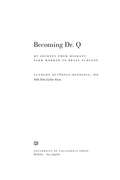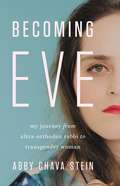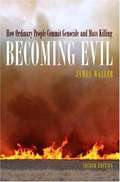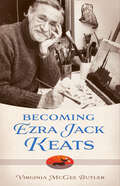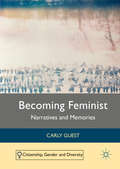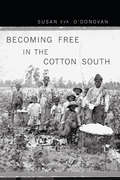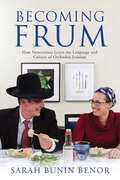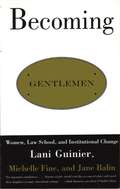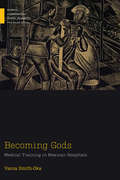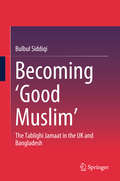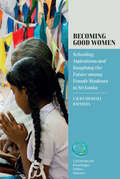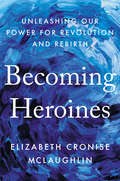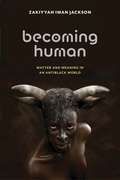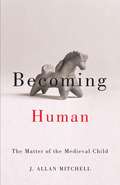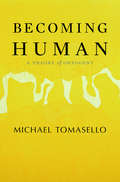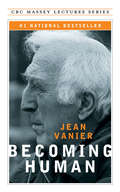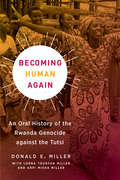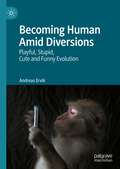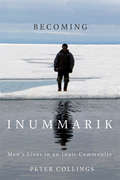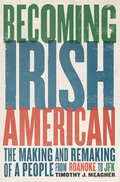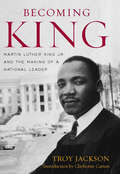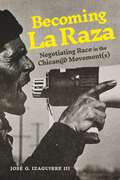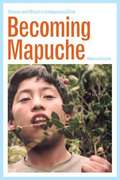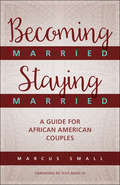- Table View
- List View
Becoming Dr. Q: My Journey from Migrant Farm Worker to Brain Surgeon
by Alfredo Quinones-Hinojosa Mim E. RivasToday he is known as Dr. Q, an internationally renowned neurosurgeon and neuroscientist who leads cutting-edge research to cure brain cancer. But not too long ago, he was Freddy, a nineteen-year-old undocumented migrant worker toiling in the tomato fields of central California. In this gripping memoir, Alfredo Quiñones-Hinojosa tells his amazing life story--from his impoverished childhood in the tiny village of Palaco, Mexico, to his harrowing border crossing and his transformation from illegal immigrant to American citizen and gifted student at the University of California at Berkeley and at Harvard Medical School. Packed with adventure and adversity--including a few terrifying brushes with death--Becoming Dr. Q is a testament to persistence, hard work, the power of hope and imagination, and the pursuit of excellence. It's also a story about the importance of family, of mentors, and of giving people a chance.
Becoming Eve: My Journey from Ultra-Orthodox Rabbi to Transgender Woman
by Abby SteinThe powerful coming-of-age story of an ultra-Orthodox child who was born to become a rabbinic leader and instead became a womanAbby Stein was raised in a Hasidic Jewish community in Brooklyn, isolated in a culture that lives according to the laws and practices of eighteenth-century Eastern Europe, speaking only Yiddish and Hebrew and shunning modern life. Stein was born as the first son in a dynastic rabbinical family, poised to become a leader of the next generation of Hasidic Jews. But Abby felt certain at a young age that she was a girl. She suppressed her desire for a new body while looking for answers wherever she could find them, from forbidden religious texts to smuggled secular examinations of faith. Finally, she orchestrated a personal exodus from ultra-Orthodox manhood to mainstream femininity-a radical choice that forced her to leave her home, her family, her way of life. Powerful in the truths it reveals about biology, culture, faith, and identity, Becoming Eve poses the enduring question: How far will you go to become the person you were meant to be?
Becoming Evil: How Ordinary People Commit Genocide and Mass Killing
by James WallerThe first edition of Becoming Evil spoke unforgettably to a world shell-shocked by 9/11 that faced a new war on terror against members of an Axis of Evil. With this second edition, James Waller brings us up to date on some of the horrific events he used in the first edition to illustrate his theory of extraordinary human evil, particularly those from the perennially troubled Balkans and Africa, pointing out steps taken both forward and back.
Becoming Ezra Jack Keats (Willie Morris Books in Memoir and Biography)
by Virginia McGee ButlerBecoming Ezra Jack Keats offers the first complete biography of acclaimed children’s author and illustrator Ezra Jack Keats (1916–1983) intended for adult readers. Drawing extensively from his unpublished autobiography and letters, Becoming Ezra Jack Keats covers the breadth of Keats’s life, taking readers through his early years as the child of immigrant parents, his introduction to illustration and writing, and the full arc of his remarkable career.Beyond a standard biography, this volume presents a time capsule of the political, social, and economic issues evolving during the span of Keats’s lifetime. It also addresses his trailblazing commitment to representation and diversity, most notably in his work The Snowy Day, which won the Caldecott Medal as the first full-color picture book to feature a Black child as the protagonist. Keats far surpassed his father’s prediction that he would be a starving artist. Instead, as shown in Becoming Ezra Jack Keats, he is now regarded as one of the most influential figures in children’s literature, having published twenty-two books translated into sixteen languages, all featuring the diversity he saw in the children outside the window of his Brooklyn studio.
Becoming Feminist: Narratives and Memories (Citizenship, Gender and Diversity)
by Carly GuestThis book offers a novel, detailed and sensitive exploration of women's engagement with feminism. Centred on the themes of generations, hope, emotions and belonging, each chapter attends to the specific and particular practices of 'becoming feminist' via a series of accessible case studies. Adopting a theoretical and methodological focus on narrative and memory, this original and absorbing work analyses the various and complex ways in which feminism and its histories are received and processed by some feminist women today. Its focus on the specificity of experience disrupts overarching narratives of feminism and its histories, whilst acknowledging that such narratives are often used to sustain, defend and maintain a secure feminist identity. In doing so, it develops a growing body of work concerned with the relationships women forge to feminism's pasts, presents and futures, with a distinct focus on the stories feminist women tell about their lives. It will appeal to students and scholars of sociology, psychosocial studies, gender studies, women's studies and cultural studies.
Becoming Free in the Cotton South
by Susan Eva O'DonovanBecoming Free in the Cotton South challenges our most basic ideas about slavery and freedom in America. Instead of seeing emancipation as the beginning or the ending of the story, as most histories do, Susan Eva O’Donovan explores the perilous transition between these two conditions, offering a unique vision of both the enormous changes and the profound continuities in black life before and after the Civil War. This boldly argued work focuses on a small place—the southwest corner of Georgia—in order to explicate a big question: how did black men and black women’s experiences in slavery shape their lives in freedom? The reality of slavery’s demise is harsh: in this land where cotton was king, the promise of Reconstruction passed quickly, even as radicalism crested and swept the rest of the South. Ultimately, the lives former slaves made for themselves were conditioned and often constrained by what they had endured in bondage. O’Donovan’s significant scholarship does not diminish the heroic efforts of black Americans to make their world anew; rather, it offers troubling but necessary insight into the astounding challenges they faced. Becoming Free in the Cotton South is a moving and intimate narrative, drawing upon a multiplicity of sources and individual stories to provide new understanding of the forces that shaped both slavery and freedom, and of the generation of African Americans who tackled the passage that lay between.
Becoming Frum: How Newcomers Learn the Language and Culture of Orthodox Judaism
by Sarah Bunin BenorWhen non-Orthodox Jews become frum (religious), they encounter much more than dietary laws and Sabbath prohibitions. They find themselves in the midst of a whole new culture, involving matchmakers, homemade gefilte fish, and Yiddish-influenced grammar. Becoming Frum explains how these newcomers learn Orthodox language and culture through their interactions with community veterans and other newcomers. Some take on as much as they can as quickly as they can, going beyond the norms of those raised in the community. Others maintain aspects of their pre-Orthodox selves, yielding unique combinations, like Matisyahu's reggae music or Hebrew words and sing-song intonation used with American slang, as in "mamish (really) keepin' it real."Sarah Bunin Benor brings insight into the phenomenon of adopting a new identity based on ethnographic and sociolinguistic research among men and women in an American Orthodox community. Her analysis is applicable to other situations of adult language socialization, such as students learning medical jargon or Canadians moving to Australia. Becoming Frum offers a scholarly and accessible look at the linguistic and cultural process of "becoming."
Becoming Gentlemen: Women, Law School, and Institutional Change
by Lani Guinier Michelle Fine Jane BalinThe Socratic method of teaching is one factor contributing to the lack of success of women in law school, according to a study by Guinier with coauthors Michelle Fine and Jane Balin at the University of Pennsylvania Law School. Guinier, the assistant attorney general for civil rights- designate in 1993, writes eloquently of law school as "a gendered academic experience" that makes "gentlemen" out of both male and female law students, and she uses self-reported accounts of students to suggest alternatives to the status quo in legal education.
Becoming Gods: Medical Training in Mexican Hospitals (Medical Anthropology)
by Vania Smith-OkaThrough rich ethnographic narrative, Becoming Gods examines how a cohort of doctors-in-training in the Mexican city of Puebla learn to become doctors. Smith-Oka draws from compelling fieldwork, ethnography, and interviews with interns, residents, and doctors that tell the story of how medical trainees learn to wield new tools, language, and technology and how their white coat, stethoscope, and newfound technical, linguistic, and sensory skills lend them an authority that they cultivate with each practice, transforming their sense of self. Becoming Gods illustrates the messy, complex, and nuanced nature of medical training, where trainees not only have to acquire a monumental number of skills but do so against a backdrop of strict hospital hierarchy and a crumbling national medical system that deeply shape who they are.
Becoming ‘Good Muslim’: The Tablighi Jamaat in the UK and Bangladesh
by Bulbul SiddiqiThe book uses an ethnographic approach to explore why the Tablighi Jamaat movement remains so successful in contemporary times. It shows that this success results from the positive image that it cultivates, and the systematic preaching activities of Tablighi Jamaat followers, and that the organisation's apolitical image, the public profile of the ijtema, the humbleness of Tablighi followers, and the attraction of belonging to the global Tablighi community all help to create a positive image of the Tablighi Jamaat among ordinary Muslims. The book also argues that the Tablighi Jamaat remains successful because of its ability to hold its followers within a Tablighi-guided life, which is perceived as protection against the Western lifestyle. Many elements of contemporary Western lifestyle are considered non-Islamic, and so by clearly defining what is Islamic and non-Islamic in modern society, the Tablighi Jamaat provides a way in which Muslims can live in the contemporary world, but remain good Muslims.
Becoming Good Women: Schooling, Aspirations and Imagining the Future Among Female Students in Sri Lanka (Lifeworlds: Knowledges, Politics, Histories #7)
by Laura BatatotaFor female Sinhalese students attending a national school in the Central Province of Sri Lanka, the school serves as a significant base for cultural production, particularly in reproducing ethno-religious hegemony under the guise of ‘good’ Buddhist girls. It illustrates that tuition space acts as an important site for placemaking, where students play out their cosmopolitan aspirations whilst acquiring educational capital. Drawing on theories of social reproduction, the book examines young people’s aspirations of ‘figuring out’ their identity and visions of the future against the backdrop of nation-building processes within the school.
Becoming Heroines: Unleashing Our Power for Revolution and Rebirth
by Elizabeth Cronise McLaughlin"A profound roadmap for how whole systems of oppression can die if we choose to do the work."—LaTosha Brown, cofounder of Black Voters Matter &“An inspiring, empowering clarion call and guide to become the heroines we were meant to be.&”—Debra Messing, actor and activist Within every woman lies a powerful healer. She is an ageless and resilient force for good, in her own life and in the broader world. This is how you find her.You were born with massive reservoirs of strength, confidence, and creativity. But oppressive structures that keep you &“in your place&” have disconnected you from your natural gifts. The decision to recover and reclaim your latent ability follows a path forged by myth and legend: the heroine&’s journey. Becoming Heroines is your guide to inner rebirth, opening the closed doors in your heart, shining a light on dark places, and ultimately, unleashing your full power. For decades, Elizabeth Cronise McLaughlin has been the go-to mentor for women who&’ve wasted years playing by traditional rules and are ready to break away. Now she&’ll lead you on a journey of radical personal transformation, starting by healing the painful memories that hold you back from living to your fullest capacity. You&’ll ditch the individualist values that pit women against one another and confront any internalized bias contributing to systems of oppression. And joining with the growing revolution, you&’ll lend your voice to those repairing the wounds of history and building a future of freedom and justice for all. More than your average leadership manual, Becoming Heroines is an invitation to claim your rightful role as the heroine of your own journey. For any woman ready to live out her values more radically, rise from the ashes of trauma and grief, and lead us all to a better world, the journey begins.
Becoming Human: Matter and Meaning in an Antiblack World (Sexual Cultures #53)
by Zakiyyah Iman JacksonWinner, 2021 Gloria E. Anzaldúa Book Prize, given by the National Women's Studies AssociationWinner, 2021 Harry Levin Prize, given by the American Comparative Literature AssociationWinner, 2021 Lambda Literary Award in LGBTQ StudiesArgues that Blackness disrupts our essential ideas of race, gender, and, ultimately, the humanRewriting the pernicious, enduring relationship between Blackness and animality in the history of Western science and philosophy, Becoming Human: Matter and Meaning in an Antiblack World breaks open the rancorous debate between Black critical theory and posthumanism. Through the cultural terrain of literature by Toni Morrison, Nalo Hopkinson, Audre Lorde, and Octavia Butler, the art of Wangechi Mutu and Ezrom Legae, and the oratory of Frederick Douglass, Zakiyyah Iman Jackson both critiques and displaces the racial logic that has dominated scientific thought since the Enlightenment. In so doing, Becoming Human demonstrates that the history of racialized gender and maternity, specifically anti-Blackness, is indispensable to future thought on matter, materiality, animality, and posthumanism. Jackson argues that African diasporic cultural production alters the meaning of being human and engages in imaginative practices of world-building against a history of the bestialization and thingification of Blackness—the process of imagining the Black person as an empty vessel, a non-being, an ontological zero—and the violent imposition of colonial myths of racial hierarchy. She creatively responds to the animalization of Blackness by generating alternative frameworks of thought and relationality that not only disrupt the racialization of the human/animal distinction found in Western science and philosophy but also challenge the epistemic and material terms under which the specter of animal life acquires its authority. What emerges is a radically unruly sense of a being, knowing, feeling existence: one that necessarily ruptures the foundations of "the human."
Becoming Human: The Matter of the Medieval Child
by J. Allan MitchellBecoming Human argues that human identity was articulated and extended across a wide range of textual, visual, and artifactual assemblages from the twelfth to the fifteenth centuries. J. Allan Mitchell shows how the formation of the child expresses a manifold and mutable style of being. To be human is to learn to dwell among a welter of things. A searching and provocative historical inquiry into human becoming, the book presents a set of idiosyncratic essays on embryology and infancy, play and games, and manners, meals, and other messes. While it makes significant contributions to medieval scholarship on the body, family, and material culture, Becoming Human theorizes anew what might be called a medieval ecological imaginary. Mitchell examines a broad array of phenomenal objects—including medical diagrams, toy knights, tableware, conduct texts, dream visions, and scientific instruments—and in the process reanimates distinctly medieval ontologies. In addressing the emergence of the human in the later Middle Ages, Mitchell identifies areas where humanity remains at risk. In illuminating the past, he shines fresh light on our present.
Becoming Human: A Theory of Ontogeny
by Michael TomaselloVirtually all theories of how humans have become a distinctive species focus on evolution. Here, Michael Tomasello proposes a complementary theory focused on ontogenetic processes. Built on the essential ideas of Vygotsky, his data-driven model explains how those things that make us most human are constructed during the first six years of life.
Becoming Human (The CBC Massey Lectures)
by Jean VanierAcclaimed as a man "who inspires the world" (Maclean's) and a "nation builder" (Globe and Mail), Jean Vanier has made a difference in the lives of countless people -- including those with disabilities and the many young people who have been moved by his life's work. Becoming Human is a modern classic that continues to resonate among the generations. In a world of competition, where the strong dominate the weak, Vanier calls on each one of us to open ourselves to those we perceive as different or inferior. This, he says, is the key to true personal and societal freedom. This 10th anniversary edition includes a new introduction by the author.
Becoming Human Again: An Oral History of the Rwanda Genocide against the Tutsi
by Donald E. MillerGenocide involves significant death and trauma. Yet the enormous scope of genocide comes into view when one looks at the factors that lead to mass killing, the struggle for survival during genocide, and the ways survivors reconstruct their lives after the violence ends. Over a one hundred day period in 1994, the country of Rwanda saw the genocidal slaughter of at least 800,000 Tutsi at the hands of members of the Hutu majority government. This book is a powerful oral history of the tragedy and its aftermath from the perspective of its survivors. Based on in-depth interviews conducted over the course of fifteen years, the authors take a holistic approach by tracing how victims experienced the horrific events, as well as how they have coped with the aftermath as they struggled to resume their lives. The Rwanda genocide deserves study and documentation not only because of the failure of the Western world to intervene, but also because it raises profound questions about the ways survivors create a new life out of the ashes of all that was destroyed. How do they deal with the all-encompassing traumas of genocide? Is forgiveness possible? And what does the process of rebuilding teach us about genocide, trauma, and human life?
Becoming Human Amid Diversions: Playful, Stupid, Cute and Funny Evolution.
by Andreas ErvikThis book develops a philosophy of the predominant yet obtrusive aspects of digital culture, arguing that what seems like insignificant distractions of digital technology - such as video games, mindless browsing, cute animal imagery, political memes, and trolling - are actually keyed into fundamental aspects of evolution. These elements are commonly framed as distractions in an economy of attention and this book approaches them with the prospect of understanding their attraction, from the starting point of diversions. Diversions designate not simply shifting states of attention but characterize the direction of any system on a different course, a theoretical perspective which makes it possible to investigate distractions as not only by-products of contemporary media and human attention. The perspective shifts from distractions as the unwanted and inconsequential to considering instead the function of diversions in the process of evolutionary development. Grounded in media theory but drawing from diverse interdisciplinary perspectives in biology, philosophy, and systems theory, this book provocatively theorizes the process of diversions – of the playful, stupid, cute, and funny – as significant for the evolution of a range of organisms.
Becoming Inummarik
by Peter CollingsWhat does it mean to become a man in the Arctic today? Becoming Inummarik focuses on the lives of the first generation of men born and raised primarily in permanent settlements. Forced to balance the difficulties of schooling, jobs, and money that are a part of village life with the conflicting demands of older generations and subsistence hunting, these men struggle to chart their life course and become inummariit - genuine people. Peter Collings presents an accessible, intelligent, humorous, and sensitive account of Inuit men who are no longer youths, but not yet elders. Based on over twenty years of research conducted in Ulukhaktok, Northwest Territories, Becoming Inummarik is a profound and nuanced look at contemporary Inuit life that shows not just what Inuit men do, but who they are. Collings recounts experiences from his immersion in the daily lives of Ulukhaktok's men - from hunting and sharing meals to playing cards and grocery shopping - to demonstrate how seemingly mundane activities provide revelations about complex issues such as social relationships, status, and maturity. He also reflects on the ethics of immersive anthropological research, the difficulties of balancing professional and personal relationships with informants, and the nature of knowledge in Inuit culture. Becoming Inummarik shows that while Inuit born into a modern society see themselves as different from their parents' generation, their adherence to traditional ideas about life ensures that they remain fully Inuit even as their community has witnessed drastic upheaval.
Becoming Inummarik: Men's Lives in an Inuit Community (McGill-Queen's Indigenous and Northern Studies #73)
by Peter CollingsWhat does it mean to become a man in the Arctic today? Becoming Inummarik focuses on the lives of the first generation of men born and raised primarily in permanent settlements. Forced to balance the difficulties of schooling, jobs, and money that are a part of village life with the conflicting demands of older generations and subsistence hunting, these men struggle to chart their life course and become inummariit - genuine people. Peter Collings presents an accessible, intelligent, humorous, and sensitive account of Inuit men who are no longer youths, but not yet elders. Based on over twenty years of research conducted in Ulukhaktok, Northwest Territories, Becoming Inummarik is a profound and nuanced look at contemporary Inuit life that shows not just what Inuit men do, but who they are. Collings recounts experiences from his immersion in the daily lives of Ulukhaktok's men - from hunting and sharing meals to playing cards and grocery shopping - to demonstrate how seemingly mundane activities provide revelations about complex issues such as social relationships, status, and maturity. He also reflects on the ethics of immersive anthropological research, the difficulties of balancing professional and personal relationships with informants, and the nature of knowledge in Inuit culture. Becoming Inummarik shows that while Inuit born into a modern society see themselves as different from their parents' generation, their adherence to traditional ideas about life ensures that they remain fully Inuit even as their community has witnessed drastic upheaval.
Becoming Irish American: The Making and Remaking of a People from Roanoke to JFK
by Timothy J. MeagherThe origins and evolution of Irish American identity, from colonial times through the twentieth century As millions of Irish immigrants and their descendants created community in the United States over the centuries, they neither remained Irish nor simply became American. Instead, they created a culture and defined an identity that was unique to their circumstances, a new people that they would continually reinvent: Irish Americans. Historian Timothy J. Meagher traces the Irish American experience from the first Irishman to step ashore at Roanoke in 1585 to John F. Kennedy&’s election as president in 1960. As he chronicles how Irish American culture evolved, Meagher looks at how various groups adapted and thrived—Protestants and Catholics, immigrants and American born, those located in different geographic corners of the country. He describes how Irish Americans made a living, where they worshiped, and when they married, and how Irish American politicians found particular success, from ward bosses on the streets of New York, Boston, and Chicago to the presidency. In this sweeping history, Meagher reveals how the Irish American identity was forged, how it has transformed, and how it has held lasting influence on American culture.
Becoming King: Martin Luther King Jr. and the Making of a National Leader (Civil Rights and the Struggle for Black Equality in the Twentieth Century)
by Troy JacksonThis biography sheds new light on King&’s development as a civil rights leader in Montgomery among activists such as Rosa Parks, E.D. Nixon, and others. In Becoming King, Troy Jackson demonstrates how Martin Luther King's early years as a pastor and activist in Montgomery, Alabama, helped shape his identity as a civil rights leader. Using the sharp lens of Montgomery's struggle for racial equality to investigate King's burgeoning leadership, Jackson explores King's ability to connect with people across racial and class divides. In particular, Jackson highlights King's alliances with Jo Ann Robinson, a young English professor at Alabama State University; E. D. Nixon, a middle-aged Pullman porter and head of the local NAACP chapter; and Virginia Durr, a courageous white woman who bailed Rosa Parks out of jail. Drawing on countless interviews and archival sources, Jackson offers a comprehensive analysis of King&’s speeches before, during, and after the Montgomery bus boycott. He demonstrates how King's voice and message evolved to reflect the shared struggles, challenges, experiences, and hopes of the people with whom he worked. Jackson also reveals the internal discord that threatened the movement's hard-won momentum and compelled King to position himself as a national figure, rising above the quarrels to focus on greater goals.
Becoming La Raza: Negotiating Race in the Chican@ Movement(s) (Rhetoric and Democratic Deliberation)
by José G. Izaguirre IIIIn 1965, striking farm workers in the San Joaquin Valley sparked the beginning of the Chican@ movement. As the movement quickly gained traction across the southwestern United States, public frictions emerged and splits among activists over strategic political decisions. José G. Izaguirre III explores how these disagreements often hinged on the establishment of a racial(ized) identity for Mexican Americans, leading to the formation of La Raza Unida, a political party dedicated to naming and defending Mexican Americans as a racialized community.Through close readings of figures, vocabularies, and visualizations of iconic texts of the Chican@ Movement—including El Plan de Delano, Rodolfo “Corky” Gonzales’s “I Am Joaquin,” and newspapers like El Grito del Norte and La Raza—Izaguirre demonstrates that la raza was never singular or unified. Instead, he reveals a racial identity that was (re)negotiated, (re)invented, and (re)circulated against a Cold War backdrop that heightened rhetorics of race across the globe and increasingly threatened Mexican American bodies in the Vietnam War. In lieu of a unified nationalist movement, Izaguirre argues that activists energized and empowered La Raza as a political community by making the Chican@ movement multivocal, global, and often aligned with whiteness.For scholars of political movements, US history, race, or rhetoric, Becoming La Raza will provide a valuable perspective on one of the most important civil rights movements of the twentieth century.
Becoming Mapuche: Person and Ritual in Indigenous Chile
by Magnus CourseMagnus Course blends convincing historical analysis with sophisticated contemporary theory in this superb ethnography of the Mapuche people of southern Chile. Based on many years of ethnographic fieldwork, Becoming Mapuche takes readers to the indigenous reserves where many Mapuche have been forced to live since the beginning of the twentieth century. In addition to accounts of the intimacies of everyday kinship and friendship, Course also offers the first complete ethnographic analyses of the major social events of contemporary rural Mapuche life--eluwün funerals, the ritual sport of palin, and the great ngillatun fertility ritual. The volume includes a glossary of terms in Mapudungun.
Becoming Married, Staying Married: A Guide For African American Couples
by Marcus SmallIt's easy to fall in love and to get married. But what does it really mean to be married? And how do you stay married? In Becoming Married, Staying Married, couples will be encouraged to see marriage as a process that never ends. Together they will reflect on current realities particular to African American couples. They will also discover nine key principles that are required for healthy marriages, including concepts like self-awareness, flexibility, maturity, and forgiveness. Practical suggestions on how to further enhance each quality are included, in addition to African proverbs and biblical Scripture that relate to marriage. Questions for discussion and reflection are included at the end of each chapter. This insightful resource can be used by African American couples at various stages of their relationship, but it is especially helpful to engaged and newly married couples. Pastor may also choose to use this book as a discussion starter for premarital counseling.
